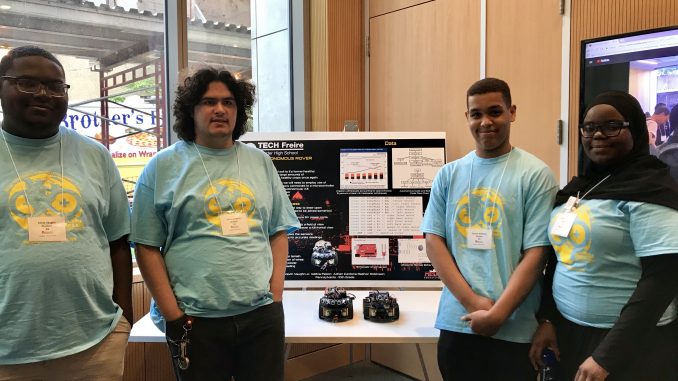
On Wednesday, 15 teams of middle and high schoolers from across the country including a group of students from TECH Freire Charter School, located right near Main Campus, gathered in the Science Education and Resource Center for their projects to be judged in the national competition organized by the Math Education Science Achievement, or MESA, program.
MESA’s annual National Engineering Design Competition, which lasted four days, asked teams to come up with an engineering solution to a real world problem.
“Our theme was to save the world,” said Rashon Robinson, an eleventh-grade student at TECH Freire Charter School located on Broad Street near Susquehanna Avenue. “So we thought about agriculture and the problems that farmers face. One problem that a farmer can face is climate change.”
The students came to compete from states around the country including Washington, California, Arizona, New Mexico, Maryland, Oregon, Utah and Pennsylvania.
MESA is a nationwide program that advocates for equal access to STEM education through classes and competitions. Students use the STEM skills they learn in MESA to create projects for MESA Day, a regional- and state-level competition. Teams that qualify at MESA Day move on to the national competition.
In this year’s competition, students were required to incorporate a small electronic board used for programming, called an Arduino, into their projects. MESA provided students with a basic Arduino kit to create their projects.
Robinson’s team’s project — which they started in December — is a rover that tests soil moisture levels through a sensor attached to its front. The four-student team from TECH Freire Charter School represented the high school level of Pennsylvania MESA at the competition.
Pennsylvania MESA, one of 11 MESA state programs, is headquartered at Temple University in the Center for Inclusive Competitiveness, a collaborative STEM program prioritizing underserved communities in innovation economies. Pennsylvania MESA allows students, particularly women and minorities, across the state to learn more about STEM through programs and trainings.
Wednesday’s activities began with teams presenting their projects to judges during technical interviews while posters explaining the teams’ projects were displayed at a live-streamed, open-to-the-public symposium.
Students pitched their prototypes to the judges and an audience—similar to the ABC show Shark Tank—on Thursday. This portion of the competition was emceed, open to the public and live-streamed.
Some of the student teams presented different versions of their rovers from MESA Day at the national competition. The TECH Freire Charter School students added a bigger Arduino board, more sensors and a breadboard, a base used to develop an electronic circuit, to their model.
The middle school team representing Pennsylvania MESA from Ad Prima Charter School in West Philadelphia modified their rover to have a hydraulic arm for picking fruits like apples, peaches and pears.

“The benefit of our rover is that we contacted some clients like Kauffman’s [Fruit] Farm and other Pennsylvania Dutch farmers,” said Johnny Gogolu, a fifth-grade student at Ad Prima Charter School. “They told us specific things to research, and by researching those specific things you can make that client invest in your product.”
Gogolu’s team designed and engineered their rover around the needs of the Pennsylvania farmers they spoke to. The farmers weren’t looking for a machine to test soil, so the team redesigned.
“It’s so important to empower these students to build on those STEM concepts as they prepare for college,” wrote Jamie Bracey, the College of Engineering’s Director of the Center for Inclusive Competitiveness and Director of STEM Education, Outreach and Research, in an email. “The national competition takes those concepts from page to practice in an intellectually challenging way.”
Bracey, who is also the head of Pennsylvania MESA, added the College of Engineering is proud to host the competition for the second year in a row.
The middle school team representing Maryland MESA from Patapsco Middle School in Ellicott City, Maryland, built a trash can, named R³ for “reduce, reuse, recycle,” that prevents users from throwing out recyclable items. The lid, which has a metal detector, motion sensor and LCD screen, stays closed while the screen displays a “please recycle” message.

“Recycled items are getting thrown into landfills, which is creating toxic chemicals,” said Srinidhi Akella, a sixth-grade student at Patapsco Middle School. “And that contributes to global warming, so we’re trying to reduce that problem.”
Akella’s team had been working on R³ for the competition since the middle of October.
The national MESA competition ended on Friday after the middle and high school awards were announced.
Akella’s team’s efforts didn’t go unnoticed by the judges. It placed third in the middle school level for technical interview, prototype pitch and overall.

Danielle Stephenson, the team’s advisor and an eighth-grade science teacher at Patapsco Middle School, said she was very proud of her team and the hard work and dedication they put into the competition.
“I’m really thankful for the opportunity that I have to offer any student that is interested in engineering the opportunity that MESA offers,” Stephenson said.


Be the first to comment